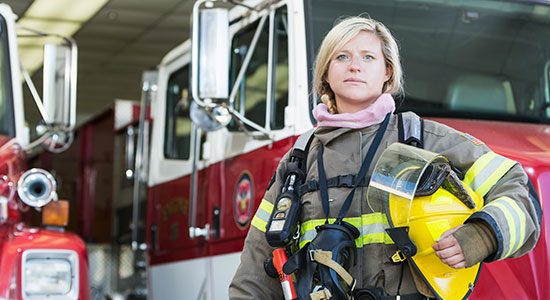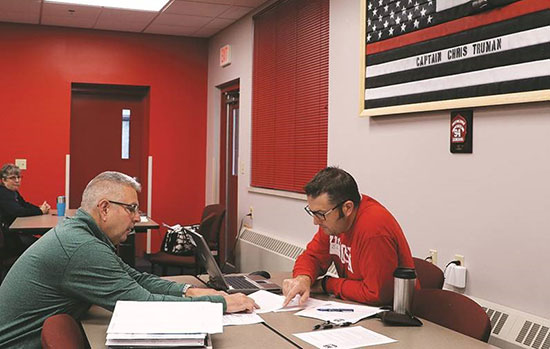
Oct. 16, 2019 – Last year, on New Year’s Eve, Lake Mills Fire Capt. Christopher Truman was off-duty when he stopped on Madison’s busy highway corridor to help a young woman whose vehicle had spun into a median in bad weather conditions.
While assisting the young motorist, another vehicle veered and crashed into the scene, striking Truman, age 46. He later died after being transported to the hospital. The tragic accident devastated the Lake Mills community. Truman was engaged to be married.
“Captain Truman was a positive influence on everyone around him,” said Lake Mills City Attorney Dan Drescher. “When he passed away, it was a traumatic experience for this small-knit community. There was a huge outpouring, and that really got us talking.”
Drescher was aware of Wills for Heroes Wisconsin, sponsored by the State Bar of Wisconsin with support from firms like Foley & Lardner LLP and other sponsors, including HotDocs software. So, Drescher helped bring it to Lake Mills.
Helping First Responders Plan Ahead
The program provides free preparation of basic wills, living wills, health care powers of attorney, and financial powers of attorney for eligible first responders (and their spouses and domestic partners), including police officers, firefighters, and emergency medical technicians. Volunteer lawyers staff clinics in communities throughout the state.
 Joe Forward, Saint Louis Univ. School of Law 2010, is a legal writer for the State Bar of Wisconsin, Madison. He can be reached by email or by phone at (608) 250-6161.
Joe Forward, Saint Louis Univ. School of Law 2010, is a legal writer for the State Bar of Wisconsin, Madison. He can be reached by email or by phone at (608) 250-6161.
Although Capt. Truman left a will, many first responders (and other individuals in communities throughout Wisconsin) don’t realize the importance of an estate plan to direct financial, health, and other decisions in the event of death or incapacity.
“Many of them have families,” said Drescher. “Especially younger individuals, they often don’t think about the importance of estate planning. And here they are running toward the action, endangering themselves. But the planning aspects are not top of mind.”
Drescher said it’s the nature of first responders, such as Capt. Truman, to put themselves at risk to help others. And programs like Wills for Heroes is one way lawyers can use their skills to say thanks. “They definitely saw the value of this program.”
“The death of Capt. Truman was an eye-opener and a contributing factor in bringing the program to Lake Mills,” Drescher said. “The money savings and the time to get it done in one day, with witnesses on site – it was a very efficient and impressive program.”
Drescher said a team of 10 lawyers helped around 20 first responders and their families obtain peace of mind for themselves and their families through customized documents that lawyers helped prepare. The documents were executed with witnesses and notaries.
“Volunteers are able use their skills as an attorney, notary, or witness to make an immediate difference for a first responder,” said Foley & Lardner Associate Sherry Clay, Madison, who coordinates the firm’s Wills for Heroes clinic outreach.
“Personally, I truly enjoy participating in the clinics, becoming acquainted with the first responders, and seeing their excitement and relief as their estate plan is created. If they have children, they always emphasize the importance of having a guardian in place.”

From left, Lake Mills Fire Chief Todd Yandre obtains help with a will from attorney Elias Swanson of Michael Best & Friedrich, Oct. 5, 2019, through the Wills for Heroes program. Photo credit: Justin Loewen of the Lake Mills Leader.
Volunteers Welcome
While the Foley firm is heavily involved, any Wisconsin lawyer can volunteer to participate in Wills for Heroes, even without any experience in estate planning.
“Attorneys from our firm volunteer, as well as other local and regional firms, and solo practitioners,” said Foley Senior Counsel Wes Taylor, who previously coordinated the program. Volunteer attorneys in Lake Mills included Clay and Taylor, as well as Kristen Crisp (CUNA Mutual), Melissa El Menaouar (Foley), William R. Hughes (Foley), Jessica Simons (Foley), Deborah Stencel (Miller & Miller Law), Elias Swanson (Michael Best & Friedrich), Ryan Van De Hey (Godfrey & Kahn), and Catherine Witczak (Foley).
The whole community is giving time and effort to support our first responders. It is a joy to be part of that community of professionals united for this purpose.
“Many of our notary volunteers come from a local insurance company. We get a healthy stream of witness volunteers from the U.W. Law School. So it does not feel like just one firm is providing this service,” Taylor said. “The whole community is giving time and effort to support our first responders. We always have first-time volunteers, and also a number of veterans who have been volunteering year after year, some as long as a decade. It is a joy to be part of that community of professionals united for this purpose.”
The Lake Mills community was the latest stop for the Wisconsin Wills for Heroes Program, which was launched in 2009 and now celebrates a decade in service.
The program originated with an attorney in South Carolina, after 9/11, and led to the creation of the Wills for Heroes Foundation. More than 25 states now participate. Other Wisconsin clinics are planned in various locations in the coming months.
But Wills for Heroes is just one pro bono program that is making a difference. A number of pro bono programs sponsored by the State Bar, local or specialty bars, law schools, or other legal groups, are also contributing many hours of free legal services.
An Access to Justice Issue
It’s hard to know how much pro bono work goes on statewide. Data from recent surveys canvas only small samples of pro bono activity. In addition, there are likely many attorneys who provide free legal work with no formal recognition.
But the Wisconsin Pro Bono Honor Society recently recognized 370 lawyers who collectively provided more than 18,500 hours of pro bono service in 2018.
“These lawyers have helped Wisconsin uphold the promise of equal justice under the law,” said State Bar Pro Bono Coordinator Jeff Brown. "Their service ensured fairness for all in the justice system, regardless of how much money you have.”
Importantly, pro bono work is a necessary component in providing access to justice for lower income individuals and families who cannot afford attorneys.
Free legal aid, and other assistance, is generally limited to those making less than 125 percent of the federal poverty guidelines for a given year. For a family of four in 2019, they would qualify with household income of less than $32,188, before taxes.
According to the U.S. Census Bureau, about 9.5 percent of Wisconsinites live in poverty. With an estimated population of 5.8 million people, that means almost 300,000 Wisconsin residents are impoverished. Many more live on modest means.
“Despite our pro bono efforts, access to justice continues to be an obstacle for people of low and modest means,” said Brown. “Data from more than a decade ago found that up to 80 percent of poor households that confront a civil legal need do so without legal assistance, and there is no recent data to suggest that situation has improved.”
The so-called “justice gap” refers to individuals and families who face a legal issue, or may have an issue they don’t recognize as a legal one, but don’t have the means to pay for a lawyer. Pro bono help may be available, but the demand is greater than supply.
Legal Action of Wisconsin and Wisconsin Judicare receive federal funding from the Legal Services Corporation to provide free legal aid to low-income families (about $5.5 million in 2019), with a large need for services on family, housing, and health issues.
Other federal fund allocations in the state budget ($1 million over two years for survivors of domestic violence and sexual abuse) and funding from other sources – including the Wisconsin Law Foundation, the Wisconsin Trust Account Foundation, and the Wisconsin Equal Justice Fund – go to help poor families with civil legal needs.
And the Wisconsin Access to Justice Commission, created by the Wisconsin Supreme Court, continually explores ways to improve collaboration and coordination around access to justice.
But there’s still a large justice gap, and pro bono programs keep working to fill it. A recent program called Wisconsin Free Legal Answers, initiated by the American Bar Association (ABA) and sponsored by the Wisconsin Access to Justice Commission with support from the State Bar of Wisconsin, allows qualifying individuals to ask legal questions online. Volunteer lawyers answer them, for free.
“Free Legal Answers is a fast and easy way for even the busiest lawyer to take a few minutes and use their knowledge to help someone who is desperate for help,” said Karen Bauer, staff attorney at the Legal Aid Society of Milwaukee.
Bauer was one of several Wisconsin lawyers who answered more than 50 civil legal questions through the Free Legal Answers service in 2018.
“I can take 15 minutes out of even my most hectic workday and make a huge difference for someone out there, and this gives me a great feeling of satisfaction,” she said. “Every lawyer has 15 minutes to make a difference in our community!”
Opportunities Abound
For attorneys who want to get more involved, the State Bar maintains a pro bono directory of opportunities through numerous Wisconsin organizations.
The State Bar pays premiums for professional liability insurance coverage for volunteer lawyers participating in State Bar-sponsored pro bono programs, and has some funds available to pay out-of-pocket costs that may be incurred for things like office supplies, mileage, expert witnesses, or transcripts. Research assistance is also available.
Both law schools also offer pro bono opportunities for law students and lawyers (Marquette pro bono and U.W. Law School pro bono). These programs give law students practice experience under the guidance of mentoring attorneys.
In addition, the federal district courts recruit pro bono attorneys to work on both prisoner and non-prisoner civil rights cases, including limited-scope representations to assist pro se litigants who need help on certain discrete aspects of a case, or for mediation.
Judge William Griesbach of the U.S. District Court for the Eastern District of Wisconsin, says these pro bono cases are a great way for younger attorneys to get trial experience, from pre-trial motions before judges to direct and cross examination of witnesses.
Foley attorney Sherry Clay says pro bono lawyers provide great value and service to their communities, and lawyers get something in return.
“Volunteering with Wills for Heroes provides a great sense of satisfaction,” Clay said. “It’s a wonderful way to actively say thanks to first responders in a practical and life-changing way. Once you experience that feeling, pro bono work feels like an honor, not an obligation.”
Interested in doing pro bono work? Visit the State Bar’s pro bono page or contact Jeff Brown by email or by phone at (608) 250-6177.
